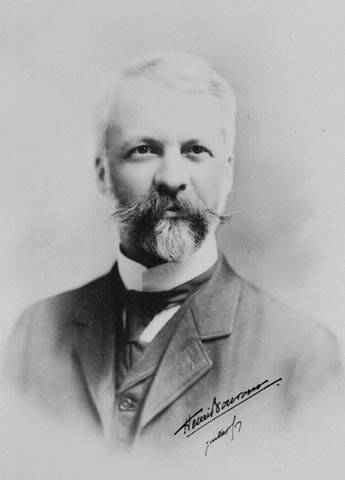George Brown set the fighting tone of his new newspaper the Globe with a motto chosen from the letters of Junius, the sharp-tongued champion of liberty against the government of George III: "The subject who is truly loyal to the Chief Magistrate will neither advise nor submit to arbitrary measures." Within a few years of its first issue on March 5, 1844, the Globe had taken its place at the centre of political discourse in Canada.
Brown grew up in Edinburgh, Scotland, surrounded by adoring sisters and a mother who idolized him. Attending the famous High School that had educated the likes of David Hume and Adam Smith, he developed a forceful intellect to complement his dominating personality.

|
| George Brown's reformers described themselves as "no dirt, clear grit all the way through" (Courtesy Library and Archives Canada/C-26415). |
The Browns immigrated to New York where they began a weekly newspaper, the British Chronicle. It was George who argued for a move to Canada where "There is no position a man of energy and character may not reasonably hope to attain - if only his will be strong and his brain sound!"
In Canada the Browns renamed their paper the Banner and quickly allied it with the Baldwin Reformers. Their pungent editorials soon gained wide attention, but the elder Brown remained preoccupied with religious issues. George needed a journal of his own, in which he could focus on politics, champion reform, attack his opponents, and rouse public opinion. At the age of only 26 he founded the Globe.
Newspapers of the day were a far cry from the fat, glossy productions of today. The early Globe was just four pages of plain print, six columns wide. It cost fivepence a copy; an annual subscription was £1. Page 1 normally featured lengthy articles lifted from the British or American press, along with close-packed reports of parliamentary debates. Page 2 contained fiery editorials and digests of world events (latest news by steamship Hibernia!). Page 3 dealt with local news such as a series on "Crime in the City," which included stories entitled "Pistols sold to Children" and the "Dog Nuisance."
Page 4 carried advertisements for items such as "Dalley's Magical Pain Extractor - the Wonder and Blessing of the Age" and the unique pleasures of "The Turkish Coffee House and Oyster Depot," and described the activities of organizations such as the Anti-Slavery Office.
Brown was a master of denunciation and his enemies accused him of introducing journalistic terrorism into Canada. When he found an enemy, as he did in Francis Hincks, he was ruthless. He called Hincks "the emperor," the "chiseller" and the "hyena," seriously damaging Hincks' career. Readers looked to the editorials for the kind of entertainment that they find today in the sports pages or in the pontification of columnists.
As Brown's politics evolved, the Globe became the mouthpiece for a new party of reformers, called the "clear grits," the forerunner of today's Liberal Party. They shared a zeal for popular democracy, for abolishing religious privilege, for cheap and simple government and for opposition to the pernicious "power of Rome."
Brown was not an early advocate of Confederation, seeing it at first as an excuse to hide the failure of its advocates to solve the problems in the united Canadas. Brown was an implacable foe of John A. Macdonald, who he said "hunted me with the malignity of a fiend." But he slowly realized that a new federation was necessary, not only to get Canada out of its continual state of political crisis but to keep the vast potential of the North West out of the clutches of the United States.

|
| George Brown's Globe office in Toronto. |
It was Brown who broke the political deadlock and took the initiative to ensure constitutional reform. He put a startling proposal to his Conservative enemies. He would not defeat their failing ministry on the condition that they would face the constitutional question.
When Confederation was still in the works, the Globe managed to scoop not only all other newspapers, but even the Canadian government, when it published the Confederation Bill four days before it arrived on the desk of the future prime minister.
On July 1, 1867 Brown arrived at the stifling Globe office around midnight. He began writing and continued through the early morning, the anxious printer waiting impatiently until 7 a.m. Brown's long article began "We hail the birthday of a new nationality." So many honours were doled out, to Macdonald, Cartier and others. Governor General Lord Monck wrote to Brown to say that he was mortified that it had been impossible for him to honour "a man whose conduct in 1864 had rendered the project of unification possible."
Though a populist and a democrat, Brown was that type of liberal who also believed in the god-given right to maximize his profits and he had no sympathy for his own workers. He was unrelenting in his efforts to pay wages well below the union scale. He was shot by a disgruntled former employee and died of his infected wound.

 Share on Facebook
Share on Facebook Share on X
Share on X Share by Email
Share by Email Share on Google Classroom
Share on Google Classroom

